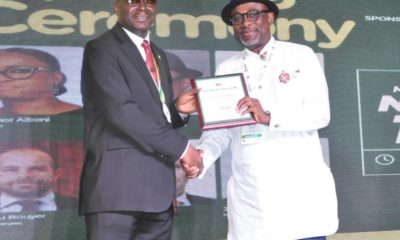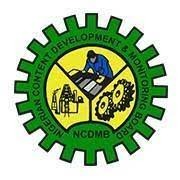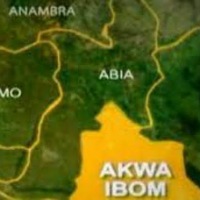Energy
NCDMB Hands Over Ultramodern Technical Workshops in A/Ibom State
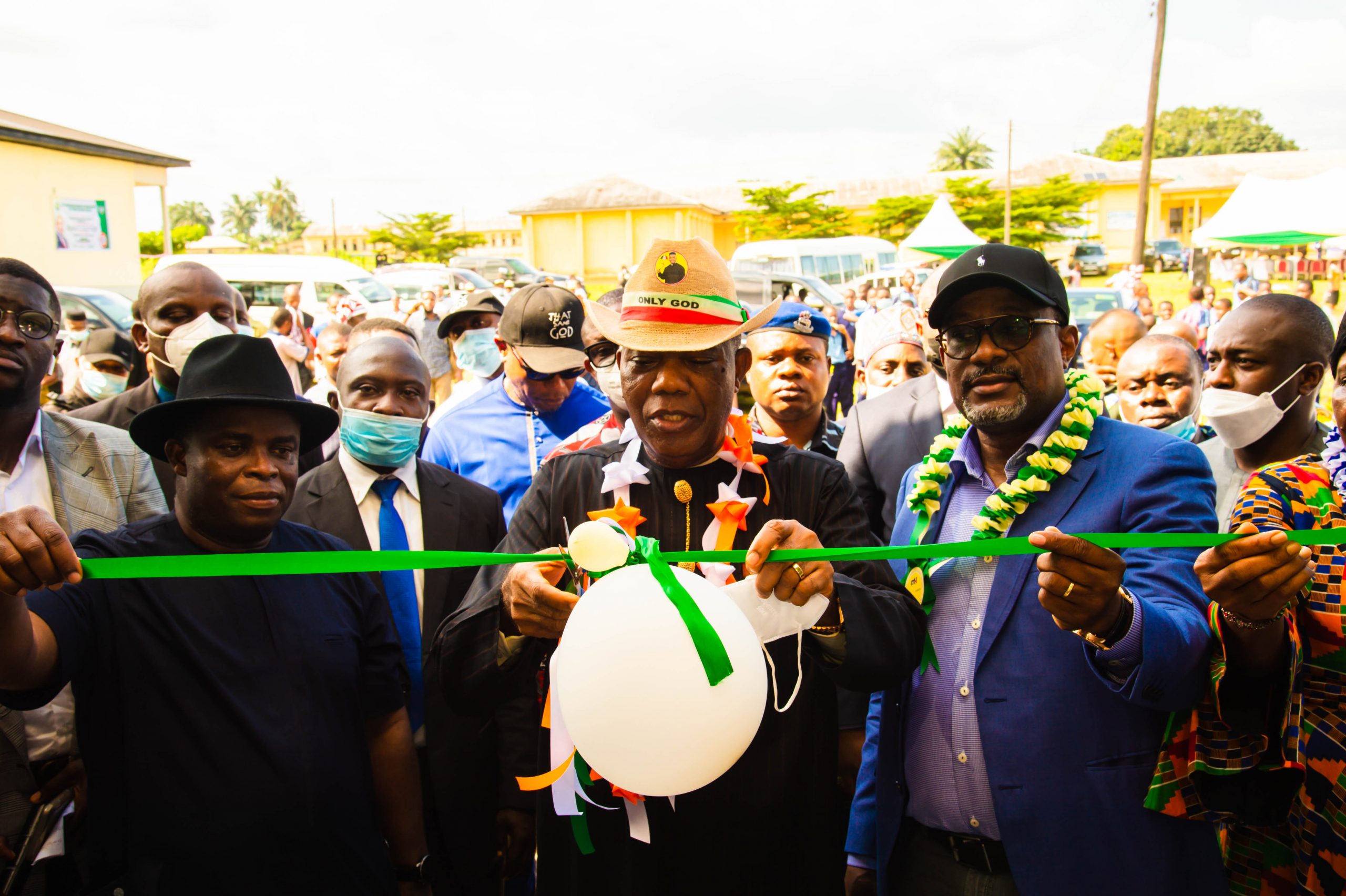
Precious ADELOLA
ABUJA-THE Nigerian Content Development and Monitoring Board (NCDMB) has handed over an ultra-modern Woodwork and Carpentry workshops it renovated and upgraded at the Government Technical College, (GTC) Abak, Akwa Ibom State.
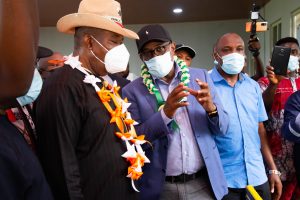
Secretary to the Akwa Ibom State Government, Dr. Emmanuel Ekuwem discussing with the Executive Secretary of NCDMB, Engr. Simbi Kesiye Wabote at the commissioning of the ultra-modern Woodwork and Carpentry workshops renovated and upgraded by the Board at the Government Technical College, (GTC) Abak, Akwa Ibom State recently.
The commissioning of the facility was performed by the Governor of Akwa Ibom State, Mr. Udom Gabriel Emmanuel, represented by the Secretary to the State Government, Dr. Emmanuel Ekuwem and the Executive Secretary of NCDMB, Engr. Simbi Kesiye Wabote.
In his address, the Executive Secretary disclosed that NCDMB invests in the rehabilitation of Technical and Vocational Education and Training Institutions, (TVETs) because they provide platforms to job creation and self-empowerment. He added that the development of skilled technicians drives the socio-economic growth aspirations of the President Muhammadu Buhari’s administration and engages youths in productive ventures.
He emphasized the need to provide high quality manpower training and skills development for the teeming youths in the country, which was why the Board undertook a study on TVETs in Akwa Ibom, Bayelsa and Rivers states to understand the factors militating against the optimal performance of those institutions.
He mentioned that the Board had finalized plans for the implementation of a public-private in collaboration with the Akwa Ibom State and a specialist modern furniture production firm, owned and managed by an indigene of the Abak community, in which a certain percentage of the proceeds will be ploughed back for the operational maintenance of the facilities to achieve self-sustenance.
Wabote commended the Abak community and Akwa Ibom State Government for their cooperation in actualizing the projects, stating that the Board’s decision to have earmarked GTC, Abak as one of the flagship beneficiaries of its institutional upgrade program was not an effort in futility. He thanked all stakeholders for the zero-incidence recorded and the unparalleled hospitality the Abak community extended to the contractors and personnel.
He charged the technical institution which is one of the foremost in the region to become a Centre of Excellence in carpentry/woodwork through the provision of high-quality training to both teachers and students in an affordable, safe, sustainable and efficient manner, while satisfying the yearnings of the local and international furniture industry as part of efforts to create wealth and diversify the economy while increasing foreign exchange earnings.
The Executive Secretary decried the low level of students’ enrolment into TVETs institutions, which is less than one percent of the total enrolment in conventional secondary schools.
Noting that youths make up more than 50 percent of the nation’s population, he regretted that the nation is yet to fully harness its potential in driving economic growth as many young people are faced with challenges ranging from lack of practical skills, unemployment and illiteracy, among others.
He also challenged youths of the country to acquire marketable skills and competencies that will position them to overcome the high rate of poverty, social vices, unemployment and underemployment in the country.
He hinted that harnessing and refocusing the creative energies of youths to productive endeavours through an aggressive skills development training in various relevant trades will foster sustainable development.
In his remarks, the Governor commended the Board for partnering with the state to renovate and upgrade the technical facility to create job opportunities for skilled manpower, which illustrates patriotism and commitment to national development.
He asserted that the project was in line with the administration’s industrialization policy of taking youths off the street through efficient skills acquisition and empowerment, and an incubation process of converting these skills into entrepreneurial gains and self-reliance.
The Executive Chairman, Akwa Ibom State Technical Schools Board, (ASTEB), Elder Godwin Udom also stated that the cardinal objective of technical schools is to train persons in diverse practical fields, adding that such schools needed standard and well-equipped workshops with specialized instructors in different trade areas.
Elder Udom expressed gratitude to NCDMB for the project, noting that the project which commenced on January 27, 2019 was now ready for the students to acquire modern skills in furniture making and for the staff to update their knowledge and also assist the unemployed in the community.
The Principal-General of GTC, Abak, Elder Friday Emmanson Udoka also expressed appreciation to NCDMB for choosing the school for its demonstration of technical education advancement. He pledged to ensure that the facilities will be put to maximum use, improving the knowledge and skill of the students and staff.
The Principal-General enumerated other assistance received from the Board to include training of two science teachers and provision of three computer-oriented machines for teaching science subjects and other related subjects to the students.
Energy
Asharami Synergy Unveils Fuelling Solutions In Omagwa
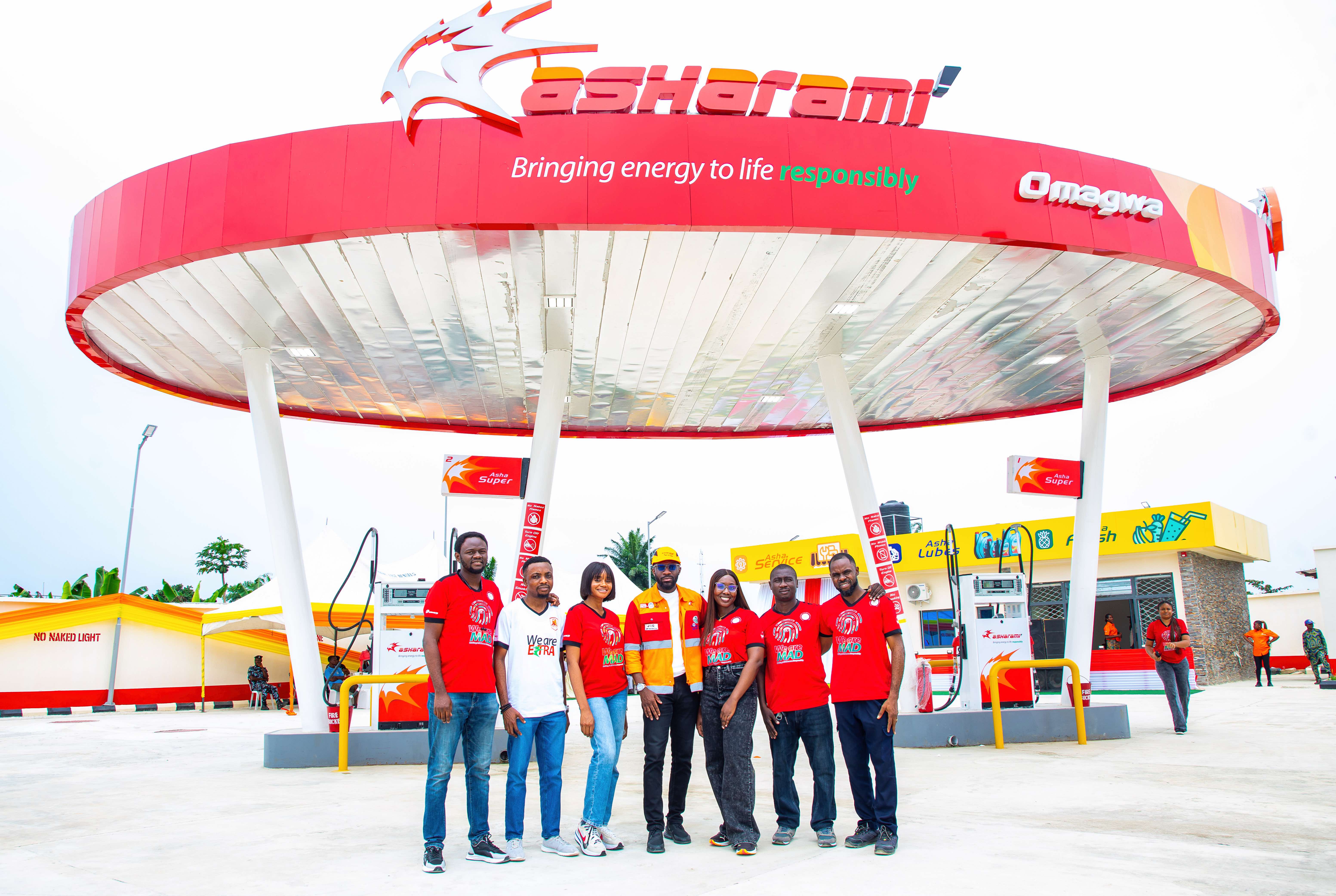
In line with its commitment to driving access to quality petroleum products, Asharami Synergy Limited, a leading Sahara Group downstream company, has said the public can now access exceptional fuelling solutions at its newly commissioned retail station in Omagwa, Rivers State.
Situated strategically along the Airport Road in Omagwa, the station, which features a storage capacity of 45,000 litres each for Automotive Gas Oil (AGO, also known as diesel) and Premium Motor Spirit (PMS, also known as petrol) is equipped with two pumps and four discharge nozzles for PMS and AGO.
The facility also has ample space for sundry services in a bid to ensure consumers get more “miles and smiles” as well as the energy to “go further” with Asharami’s world-class products.
“The Asharami Omagwa Retail Station is fully operational, offering a range of premium products and services. It’s a one-stop shop that also gives our esteemed customers eat-in and take-out restaurant services, shopping, as well as the Asha lubricants and Asha Service experience which will ensure premium care for all classes of automobiles and engines,” said Oladimeji Williams, Head, Government Relations and Business Development at Asharami Synergy.
ALSO READ: NNPCL Launches Utapate Crude Oil Blend, Eyes Production Expansion In 2025
At the Commissioning, Willaims said the new station represents an important step in Asharami Synergy’s expansion plan aimed at reaching and serving more communities responsibly. “This station is strategically positioned close to the airport, serving as the gateway for powering socio-economic development in the community and those close to it, while enabling Asharami Synergy integrate all aspects of its downstream business towards ensuring efficiency and value for our customers,” he stated.
Williams commended the Federal Airport Authority of Nigeria (FAAN) and the Omagwa community leaders for their support and collaboration throughout the project’s duration, describing it as a “seamless and productive process that highlights Asharami’s corporate stewardship and social impact” in the community.
Similarly, Ifesinachi Ezike, Regional General Manager (South South), FAAN, emphasized the broader significance of the new station, stating, “This occasion marks a significant milestone not just for Asharami Synergy but for the airport and the entire community. It marks not just an opening of a new facility but the beginning of a renewed commitment to enhancing the travel experience of all our passengers and stakeholders”.
In a move that underscores its commitment to sustainability and community development, Asharami Synergy also commissioned a solar-powered borehole during the launch. The borehole is set to improve access to clean and reliable water for residents, marking a tangible contribution to the local community.
“At Sahara, we are always making a difference—not just through our business operations; we are unwavering in our commitment to driving sustainable development and building partnerships that enhance the well-being of our host communities,” Williams added.
Energy
Awards Galore For Shell, Staff At NAPE 2024 Conference

The Shell companies in Nigeria and staff won awards in recognition of their robust participation at the 42nd Annual International Conference and Exhibition of the National Association of Petroleum Explorationists (NAPE), held in Lagos.
At the closing dinner of the event, the Managing Director of Shell Nigeria Exploration and Production Company (SNEPCo), Ronald Adams pledged sustained efforts by the company to address “the Nigerian energy trilemma by powering progress towards energy security in a sustainable manner”.
On the awards, the Shell was declared Best Overall Exhibitor and Best Exhibiting Energy company (International) just as Geophysicist Somime Oguntola took home the Award of Excellence for Oral Paper (second place).
The icing on the cake was a Shell staff, Johnbosco Uche, being installed as the new President of the NAPE.
It was gathered that the Shell companies in Nigeria have supported NAPE since its founding in 1975, using the skills and expertise of the large pool of energy professionals in its employment to improve its activities especially educational and mentoring programmes.
In addition to being a major sponsor of the 2024 conference, Shell mounted a high-profile exhibition, featuring among other things, career counselling, engagements on Nigerian Content and Contractor development and panel sessions on Women in Industry and Sustainability Energy Challenge.
A highlight was the Shell medical stand which attended to more than more than 500 conference participants and members of the public over the four days of the annual event. The doctors and nurses offered a wide range of services including laboratory tests, deworming, medical consultation as well as ophthalmology checks and distribution of nearly 300 eyeglasses.
Adams referred to the operations of SNEPCo as an example of Shell’s contribution to energy security in Nigeria. “As a result of sustained production from Bonga, we have provided funds to finance development, created a new generation of Nigerian Deepwater professionals, empowered indigenous contractors and service providers, and implemented social investments that have touched lives in the six geo-political zones of the country,” he said.
Adams added, “SNEPCo and indeed Shell are in Nigeria for the long haul. Our commitment is reflected in both our current and growth plans, all of which are grounded in principles of safety, affordability, and competitive performance.”
Energy
Accugas Denies Culpability In Akwa Ibom’s Power Outage

Owing to the persistent power outage, which has crippled economic and social life in most parts of Akwa Ibom State and environs, Accugas Limited has washed its hands off the ugly situation.
This was contained in a statement under the signature of its Communications Manager, Okwudili Onyia, in which the company traced the anomaly to a “fault in the 132-KV Aba-Itu transmission line”.
To ameliorate the situation, the company maintained that “It is imperative that the restoration of the Aba-Itu line is completed as soon as possible.”
In addition, the company pledged thus, “Accugas will continue to partner with, and support, the government of Akwa Ibom State towards achieving the government’s agenda for economic development and prosperity of the state.”
ALSO READ: NNPC Ltd To Supply 100mmscf/d Gas To Dangote Refinery
The statement reads, “Accugas Limited, a subsidiary of Savannah Energy, wishes to strongly deny the misinformation concerning its alleged involvement in the current power outage in Akwa Ibom State.
“The power cut in Akwa Ibom State is entirely due to the reported fault in the 132-KV Aba-Itu transmission line, which, unfortunately, is preventing power being transmitted from the National Grid into the State. It is imperative that the restoration of the Aba-Itu line is completed as soon as possible.
“Ibom Power Company (“IPC”) is one of 23 thermal power generation companies which channel power to the National Grid, which in turn disseminates all accumulated power to each State of the Federation through the electricity distribution companies (“Discos”). Indeed, Accugas supplies gas to enable c. 20% of Nigeria’s thermal generation capacity and, as such, is a critical enabler of the Nigerian economy.
“Within Akwa Ibom State, Accugas has been the sole supplier of gas to IPC since 2014 and, together with other Savannah subsidiaries, has invested over US$1.5 billion in gas development within the state. Furthermore, Savannah has recently invested c. US$45 million in a gas compression project at Accugas’ Uquo central processing facility at Esit Eket. Accugas’ commitments also extend to several social investment projects in the state. All the foregoing investments and projects, including other imminent investments Accugas intends to make in the State, demonstrate the Company’s long-term commitment to Akwa Ibom State and Nigeria.
“Accugas will continue to partner with, and support, the government of Akwa Ibom State towards achieving the government’s agenda for economic development and prosperity of the state.”

